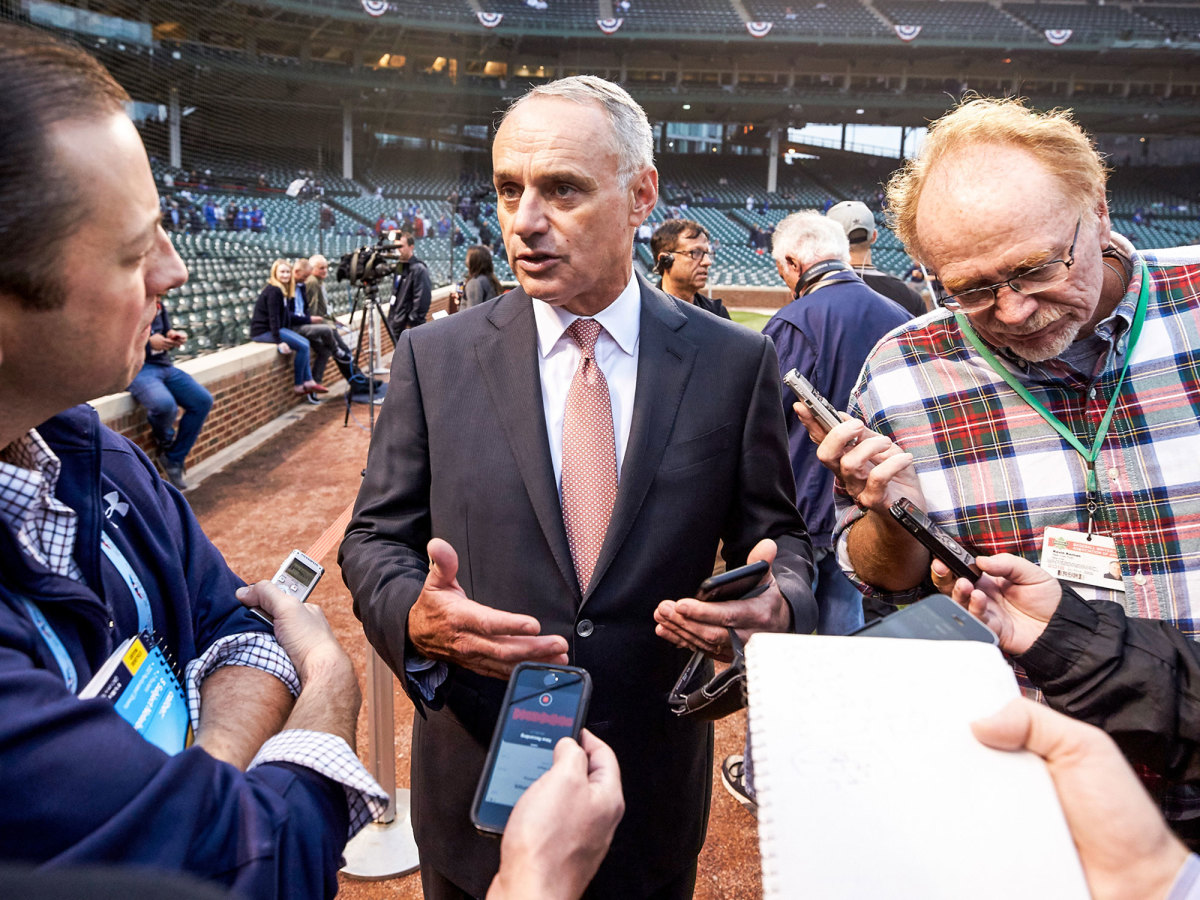Where Does Rob Manfred Go From Here?
How are you doing, Rob Manfred?
It's a reasonable question to ask. MLB's commissioner has swirled in the news cycle for months, forever embroiled in the latest round of contentious negotiations with players or another outcry about the league's COVID-19 protocols. Baseball is the laughing stock among the pro sports that have returned as MLB struggles to cope with life outside of a bubble.
So, what should the next move be for MLB's commissioner? Manfred and his sport don't look particularly good now, and haven't for months. SI's MLB staff weighs in on Manfred and what he can do from here.
Tom Verducci
By and large commissioner Rob Manfred has done a credible job dealing with an incredibly fluid situation. He has acted with an abundance of caution and shown flexibility even in the face of tradition (seven-inning doubleheader games, road teams as home teams, swapping dates, tightening protocols, etc.) Baseball is no different than any business these days: attacking the riddle of how to restart business while putting a premium on health and safety.
Manfred’s problems are largely ones of perception. While media can round up any academician, epidemiologist or “expert” to play second-guesser and essentially say anything beyond wearing a haz-mat suit in a remote cabin is reckless and dangerous, Manfred and his health and safety advisors have chosen a low profile.
In anxious times, information and transparency are calming forces. While baseball does release weekly testing figures–the overall positive rate is one-tenth of one percent–press releases only go so far. Video is much more viral, to borrow a phrase. Weekly press conferences, either by Manfred or his top health advisor, could help.
Stephanie Apstein
Rob Manfred should devote most of his energy to figuring out how to stage the postseason in a bubble. Each day, the league gets more determined to finish the season, and the pandemic gets worse. Meanwhile, the NBA and the NHL are operating mostly smoothly. There are a lot of ways to handle this, but off the top of my head: One league plays in Los Angeles, the other in New York City. If you add San Diego and Philadelphia, you can have three ballparks operating. Players and staff—even the local ones—take over a hotel, and they go from their rooms to the bus to the park and back. Eliminate half the teams each week or 10 days, giving you fewer people to keep locked down. Then play the World Series at Dodger Stadium. Manfred's reputation is in tatters, but successfully—and safely completing the postseason would be a good way to start rebuilding it.
Emma Baccellieri
It's not ideal that Manfred's last full press conference was February 16. (And that one didn't exactly go swimmingly—piece of metal, anyone?) At this point, however, I think that the best strategy for the commissioner may just be to lay low.
While it would be nice to hear a candid assessment from him about what baseball got wrong in its initial return to play, what's been done to address that, and whether he's confident that those adjustments should be sufficient to hold the rest of the season safely... I'm not sure that a candid assessment would be what we'd hear there. And if we heard, say, defensiveness or a move to shift blame instead, then we're back where we started. So I think his best move now is trying to offer fans as little reason to think about him as possible—which, of course, also requires trying as much as he can to ensure that there are no further outbreaks or other disasters, which would make forgetting about him impossible.
Connor Grossman
Initially I believed Rob Manfred's next action should be appointing a medical official to deliver public updates (and an independent assessment) of MLB's COVID-19 protocols. I still believe that to be a good idea, and Matt details that below.
But right now I think it would be best to deliver a message addressing his and the league's missteps so far, vow to do better and take questions from the press. Why? Because passing off a snippet of a quote to ESPN or sitting down for an MLB Network interview hasn't changed anyone's perception of the state of the sport: chaos.

Matt Martell
Rob Manfred needs to appoint a medical official to lead a team of other medical experts to handle all coronavirus-related issues in MLB. Let's call that person the MLB Chief Coronavirus Officer (CCO) and they would be the Dr. Fauci of MLB. The CCO's job would be to appoint a team of medical experts to consult with on all of MLB's COVID-19 protocols. Of course, this should have been done before the season began, but it's not too late to get this right. The CCO and its team would be independent of the commissioner's office, and could not be removed without the approval of both the league and the union. This would allow them to speak freely, make recommendations and institute health policy, without having to worry about repercussions.
Of course, Manfred's woes extend far beyond his handling of the coronavirus. But for now, appointing the Chief Coronavirus Officer should be his immediate step to start fixing all the dysfunction stemming from his office.
Michael Shapiro
Rob Manfred appears to have entered the Roger Goodell zone, in which nothing he says will alter the public's perception of him. That's not unearned after their respective commissionerships, and neither individual is exactly bursting with charisma. But Goodell–and Manfred–aren't accountable to the public. They're accountable to the league's owners, and the game's health writ large. The best thing Manfred can do is keep a low profile, ensure positive COVID-19 tests are kept to a minimum and guide MLB out of "turbulent" financial times. Manfred will never be Adam Silver. He'll never have the admiration of fans. Should he really care? Keeping the sport on track remains his only true objective in 2020 and beyond.
